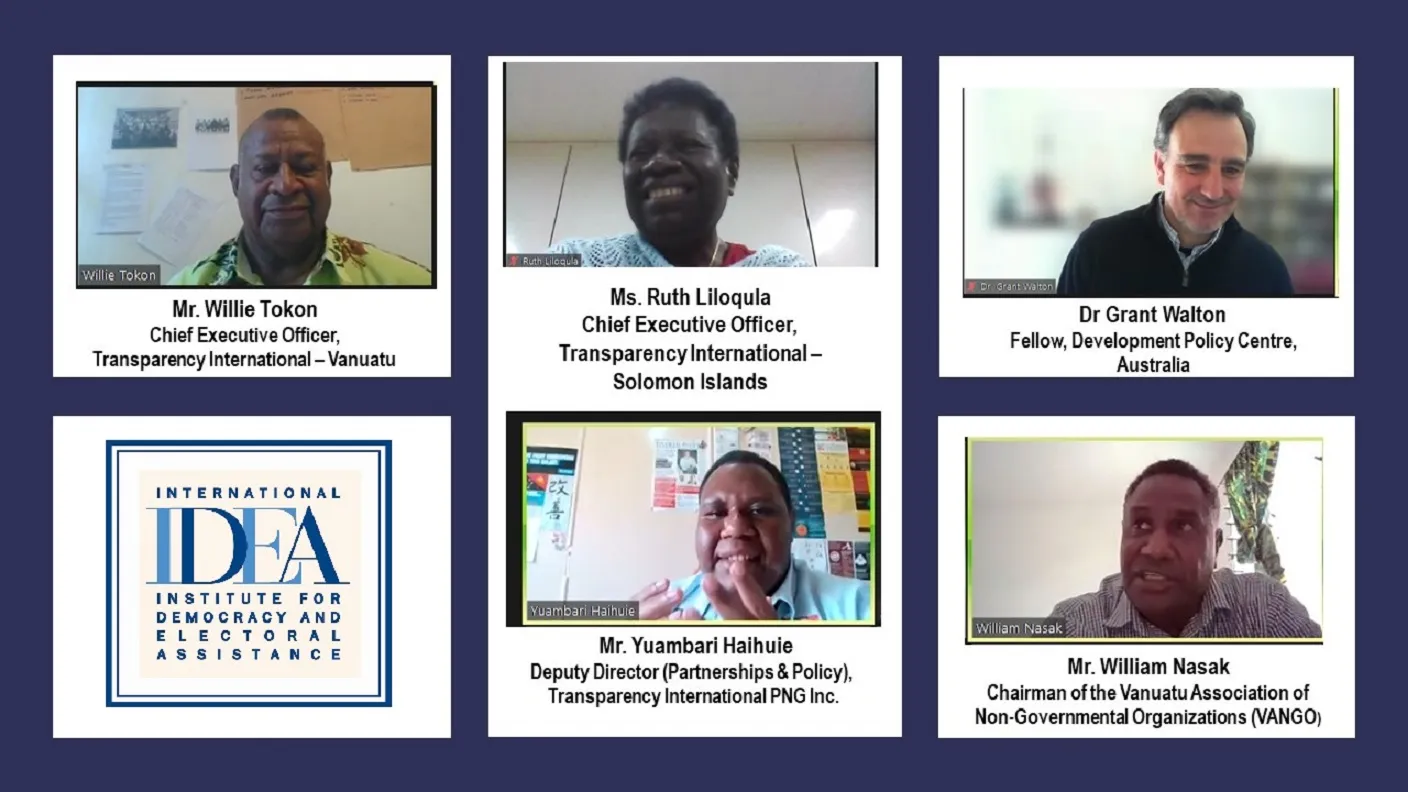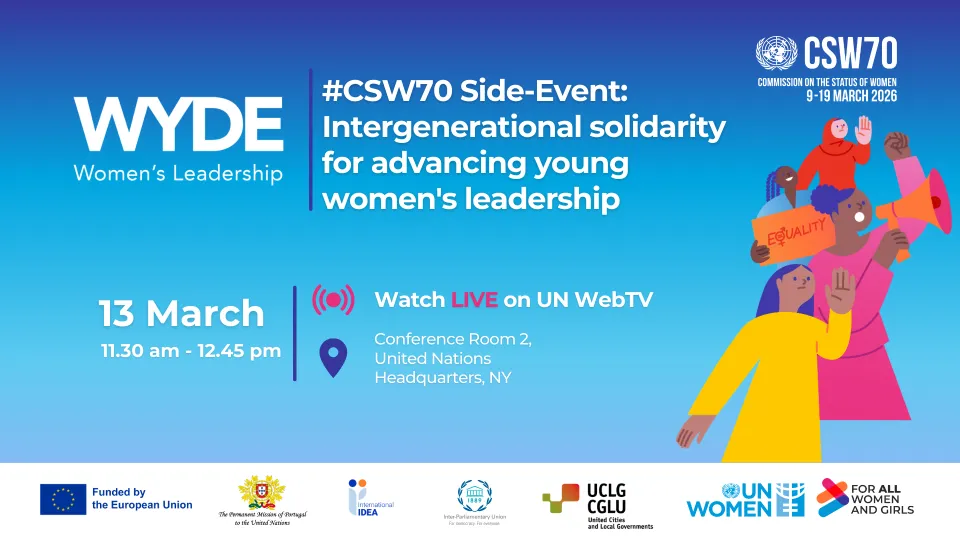'A Ray of Hope': The fight against corruption in Melanesian countries

International IDEA conducted three webinars exploring corruption in the region as part of the “Democratic Development in the Melanesian webinar series 2022”. Absence of Corruption is one of the key attributes used to monitor the quality of democracy under International IDEA’s Global State of Democracy Indices. Through the webinars, it was intended that the participants would gain knowledge about the issue of corruption and hear the experiences of other countries, which in turn will enhance debates on institutional and procedural improvements in their respective democracies.
Are anti-corruption reforms working in Papua New Guinea?
Featuring remarks from Yuambari Haihuie, Deputy Director at Transparency International PNG Inc (TI-PNG) and Dr Grant Walton, Fellow at Development Policy Centre Australia, the first webinar held on 8 November 2022, featured discussions on the effectiveness of the anti-corruption reforms that have been enacted in PNG.
Drawing insights from Transparency International’s 2021 Corruption Perception Index (CPI) report, Yuambari Haihuie gave an overview of PNG’s standing in the CPI report. According to the report, PNG scored 31/100 with a ranking of 124/180 countries where the global average score is 43/100 and the Asia Pacific average score is 45/100. According to the report, the PNG score has improved by four points compared to the previous year, but it is still performing lower than other countries in the Melanesian region.
Yuambari Haihuie said that the increase in PNG’s score was due to the development of laws which saw the establishment of the Independent Commission Against Corruption (ICAC) and the enactment of whistle-blower laws. “So, these legislative changes contributed to the slight increase, but it is still important to have the practical application of this law,” he said.
Through assessments done by TI-PNG, it was found that there was still a gap between laws in the country and the practice. “We find that there is an integrity gap between the level and quality of the laws, which is adequate, but then the practice is not adequate, and it creates a gap between what is enforced by the agencies responsible and what is allowed within,” he said.
Corruption and anti-corruption in the Solomon Islands
The second webinar held on 22 November 2022, featured Ruth Liloqula, Chief Executive Officer, Transparency International Solomon Islands (TISI), and again Dr Grant Walton, Fellow at Development Policy Centre Australia, focused on the level of corruption in the Solomon Islands and the anti-corruption measures that have been adopted by legislators to mitigate the level of corruption.
Referencing Transparency International’s 2021 Corruption Perception Index (CPI) report, Ruth Liloqula provided an overview of the rating since 2016. According to Ruth, “Solomon Islands was the country in Asia Pacific Region in 2018 that improved its score the most from 2017 to 2018 (+5 points)”. Ruth attributed the increase in rating to the passing of anti-corruption laws and the establishment of the Solomon Islands Independent Commission Against Corruption.
Ruth Liloqula further elaborated as to why the score of the Solomon Islands stagnated after 2018 despite the government's corruption fight. According to Ruth Liloqula, “The very institutions that should lead this fight and protect democracy are the most corrupt”. Accountability in the decision-making of the government and the “little integrity” in the relationship between the government and the private sector hinder the fight against corruption despite the laws.
The case of PNG and the Solomon Islands
Dr Grant Walton, who spoke at both webinars, picked up on Haihuie’s linkage of legislative changes and the practical application of laws and Ruth’s insights on why the score is stagnating despite the new laws. Using the Worldwide Governance Indicators, Dr Walton showed PNG’s and the Solomon Islands' ranking when it came to “control of corruption”. The data reveals that PNG has the least control of corruption in the Oceania region which is why PNG’s ranking in the CPI has not changed significantly given the changes to the laws to tackle corruption. The Solomon Islands is second last among Melanesian countries, which shows that the lawmakers are not effectively controlling corruption.
(Credit: Courtesy of Dr. Grant Walton’s presentation slide)
In his presentations, Dr Walton discussed ways to address corruption in PNG and the Solomon Islands. Dr Walton emphasized the need to strengthen government institutions including national police forces. According to Dr Walton, funding, resourcing and strengthening networks were essential for police to carry out their duties effectively. While revealing findings from his research, Dr Walton “pointed to the importance of increasing women in the police force” as a means to help in improving female reporting in the public service. Dr Walton explained that women fear being victimized for reporting corruption which at times becomes violent. Thus, creating a safe space is important for women in PNG. Dr Walton also emphasized that training and awareness were needed among the civil servants so that they can deliver the reforms.
Education and targeted messaging were also discussed to address corruption in PNG and the Solomon Islands. With much of the population living in rural areas, they have a different perception of corruption and this needs to be looked at while addressing corruption. Dr Walton drew an example from a focus group discussion where a respondent said that “if a candidate comes and bribes people openly and lets the community leaders know, then that's good. But if there are only a few people in the community that get a benefit from that bribe, then that is actually wrong”. Therefore, targeted messaging is important for PNG since people have a different understanding of corruption.
While agreeing to the response to a question from a participant who asked Ruth’s view on the perception that culture in Melanesian countries promotes corruption, Dr Walton said that there is “potential for culture to play a role” in fighting corruption. Ruth explained that people in the Solomon Islands are “culturally sensitive and culturally savvy” thus it is important for people to understand the cultural practices and how they operate. Ruth believes that “culture can actually help fight corruption because there is trust and there is confidence”.
Intrigue and corruption in Vanuatu
The third webinar held on 1 December 2022, featuring Mr Willie Tokon, Chief Executive Officer of Transparency International Vanuatu (TI-Vu) and Mr. William Nasak, Chairman of the Vanuatu Association of Non-governmental Organisations (VANGO) focused on intrigue and corruption in Vanuatu. With a score of 45, Vanuatu remains stagnant on the CPI ranging between 43 to 46. Mr Tokon said that the result which is hovering between 43 and 46 indicates that there is a lot of work that needs to be done to tackle corruption and the current trend depicts that Vanuatu is taking a step forward and a few steps backward when it comes to fighting corruption.
Mr Tokon explained that “Vanuatu is a champion in signing international conventions on anti-corruption work and human rights, but enforcement is a big issue.” Mr Tokon noted that Vanuatu has anti-corruption institutions, an audit department, an Ombudsman’s office, financial intelligence unit, and civil society organizations (CSOs) that advocate anti-corruption issues and human rights but “getting things forward or prosecuting people or revealing corrupt activities is not happening as it should.” One contributing factor for the lack of action is that these “institutions are weak because financially these institutions do not have the capacity to even go out” and educate people about the role of the institutions.
Nepotism and favoritism are also rife in Vanuatu. Mr Tokon revealed that people working in government who manage budgets and funds from overseas have side businesses and these businesses often win government tenders. Elaborating further, Mr Tokon said that inappropriate appointments to posts in government and statuary bodies were also a concern. Drawing an example from Vanuatu’s national airline, “which is in a big mess,” Mr Tokon said that people on the airline board are not qualified nor experienced in the airline work but are appointed through nepotism and favoritism.
In his presentation, Mr William Nasak acknowledged that Vanuatu still has a serious corruption problem despite some progress in fighting corruption as revealed by the CPI data. Mr Nasak said that the data indicates that country needs to build on recent improvements and continue to strengthen those internal processes. On the other hand, Mr Nasak said that “a gap analysis needs to be carried out for the current legislations in place and identify the loopholes and strengthen the existing legislation”.
While talking about the role of CSOs in fighting corruption, Mr Nasak said that NGOs and CSOs have weak governance structures and the internal governance needed to be sorted out before “jumping up and down and talking about corruption within the government”. Mr Nasak revealed that VANGO had suffered from malpractices on part of the corruption in the past which limited VANGO in fulfilling its duty as an umbrella organization. VANGO has appointed a new board and is strengthening visibility so that effective work can be carried out. Mr. Nasak believes that “if somebody is supposed to be holding public servants to account for the money that is spent, then VANGO should be that voice”.
While responding to a question raised by a participant on the effectiveness of the whistle-blower policy, Mr Nasak said that if one wishes to be a whistle-blower then one must “do it at your own risk”. According to Mr Nasak, most people who tend to see the wrongs are scared to talk about it because there is no mechanism to protect the whistle-blower. He further explained that if one thinks of doing something right, then there is always somebody who sees that as a threat, and they will ensure that person’s employment is terminated. Mr Tokon backed the response of Mr Nasak by sharing his personal experience in public service where he was “kicked out” for making hard decisions.
Conclusion
Despite the low scores of PNG, the Solomon Islands and Vanuatu, there is optimism that corruption can be controlled in the region if everyone joins hands. With PNG expecting to have the Independent Commission Against Corruption (ICAC) operational in 2023, there is a confidence that ICAC will help in controlling corruption in PNG by working with sister agencies like Police and Ombudsman’s Office. Educating constituents on corruption and its impact by using NGOs and social media is a step forward for the Solomon Islands and Vanuatu where geographical barriers do not allow all citizens equal access to information from the legislators. Corruption can be effectively controlled through the engagement of informed people who are able to speak freely and blow the whistle on corruption without fear of reprisal. There were other interesting discussions during the question-and-answer session in the three webinars which can be accessed on the Democratic Development in Melanesia Webinar series playlist on YouTube.




